 |
|
In 1923
|
|
My name is Ruth, Mr Scholes elder daughter and I'm pleased to speak about my father who was William Alfred Scholes. He was born on the 11th of December 1905 and lived at 74 Queen Street. One of a family of five his father was Harry Scholes and his mother Lucy. He married Winifred Giles in 1929 and they lived at 105 High Street South. In the Salvation Army he became a singing company leader, a childrens choir, when he was only about 16 or 17. Then he became the deputy bandmaster for about 25 years and was the choirmaster for an equal amount of time. |
I was born in 1930, my sister in 1933 and my father worked in the Co-op factory, my mother at Chapmans. When I was born he played the trombone to try and get me to sleep, so he told me and he was a very loving father, he used to sing to me.Things were very difficult in the shoe factory in those years and they were on short time; two days on, two days off or three on, three off and they didn't get any dole money. He was very interested in sport, they used to play cricket and football up in the fields at the top of Queen Street, darts and billiards indoors somewhere with other people in a similar situation.
Then in 1936 we all moved to 12 Wymington Road. It was the second house so it was called number 2 but then they altered it to 12. Before that he had an opportunity to go to Cornwall to be a bandmaster in a band and he was seriously considering it because of the difficulties in the shoe factory when he heard of a coal business that was for sale - a Mr Paragreen - along Duck Street who had a horse named Oscar and a cart. He didn't know whether to buy this but didn't have enough money. Then he prayed about it and said. 'if I haven't heard anything by 12 o'clock that will keep me here I shall go to Cornwall.' Then his great friend, Ernie Denton, came to the house and said. 'Oh, I'll lend you the money to buy this business if you stay.' Just as he said that, the clock struck 12 so he took that to be a sign and bought the business. With it came a fellow called Cyril Wykes who was a bit, you know, he used to drive the horse and father went at the back on a bicycle. Also about that time St Margarets Avenue was built and he knocked at all the houses and said if you pay me half a crown a week in a club I will see that you've got coal summer and winter. So he started this club which went on right to end of the business, he got lots of customers and did very well.
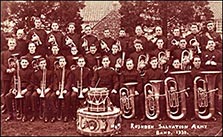 |
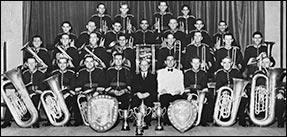 |
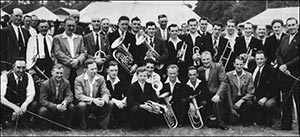 |
|
Salvation Army Band
|
Rushden Temperance Band
|
Deiniolan Band
|
All of that time he was working hard with the Salvation Army with the band and the choir and always full of ideas for getting new things to happen. They used to have special concerts and all that kind of thing. He was very good at that, he could see potential in people and he was always encouraging people to work and to do different things, very innovative I think the word would be. The war came and things changed, got better in a good many ways. Dad was a Special Constable in the wartime, we found his whistle that he used to take round in his pocket but he didn't go into the forces. He was taking postal lessons from a very famous musician called George Marshall in 1940, but from then on he did go to take the diplomas for the London Guildhall School of Music and the British Bandsmans College of Music in 1946. He passed with honours, he had a Gold Medal, he was the best pupil. He used to go for tuition to Frank Wright and Alfred Ashpole who lived at Bishop Stortford. I remember going with him once and my mother who had rheumatoid arthritis and was not in the best of health for quite a number of years. We went with him and sat in Albert Ashpole's garden while Dad was having his music lesson, to give us a ride out and to give mother a break from being indoors rather a lot.
| I can remember him sitting in his armchair and we had a radiogram and he had to conduct Beethoven Pathetique to practice his conducting. He did a lot of studying, oh yes, he was very keen. Because of Mother's ill health, she had Raynauds disease and very bad rheumatoid arthritus her hands were really curled up and her feet. I don't remember her ever being in good health right from us being little, she was very poorly so we stayed at home after we left school. Ruth first and me second to help do the housework, look after her and do a little bit of office work for the business as well. Also then when father used to go off to these different places we would go with him for the ride to give mother a change and for us to be with her while Dad was having his lessons. Ruth remembers more about going to London, I only remember going once. I think that was my favourite, we went and stayed at a hotel, I know it was for two nights but I mean that was absolutely wonderful just after the war when not much very exciting happened here. |
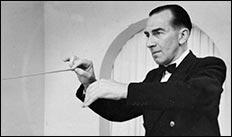 |
|
Conducting
|
|
He was getting deeper and deeper into music and he went and taught bands to play. He did quite a few, he did Deiniolan, Clydebank, Ashbourne and Oldbourne. Then he did Towcester and Kibworth, he did them more often, the others perhaps it was only once a year that were in Wales and Scotland, training for contests. He did adjudicating for contests as well but he had this gift of making bands that weren't playing too well play so much better, that was his special gift, and they did appreciate it. They always called him Mr Scholes, never Bill because they did revere him and realised his expertise, I mean he knew instantly if anything was wrong and his interpretation was wonderful. Resurgum by Eric Ball was one of his favourites and another one Kingdom Triumph, a Salvation Army piece, he played it with our band when he was still conducting them at Tunbridge Wells and it was said that it had never been played better by any band and I believed that.
| Father had been taking the Salvation Army band with great success but when the previous person came back, Mr William Giles, he really didn't have a place and he wanted to do more conducting. Mr Willie Capon, who was the president of the Rushden Temperance Band, came and asked him if he would consider taking the Temperance Band. Salvation Army Rules were very strict at that time, they had Sunday practices I believe and also if you were in the what we called the outside bands you couldn't be in the Salvation Army Band. So it was a really big decision but he decided to go for it. That was in 1947 and then he did so well with them that they became 4th in the All England at the Albert Hall. |
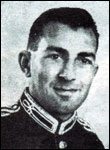 |
|
In 1949
|
|
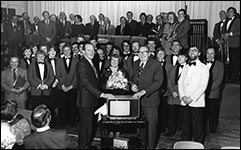 |
|
The Kibworth Presentation
|
|
Mainly he went to the other bands to train them in readiness for a big contest. He would go for three months and sometimes he would stay there for two weeks whereas with the Temperance Band he was the resident conductor and I'm not sure for how long but anyway he went to Kibworth Band. He got very friendly with Roy Castle because he sent a message, they did him a "This is your Life" at Kibworth and it was very successful and praising him for all he'd done and that and they gave him a television and he was delighted with that. |
Franklin Engleman came from the BBC in 1961 that's right, for “Down Your Way”. I know he interviewed John White and he came to this house to interview my father. I didn't hear the interview but I saw the man, he was a very big man.
 |
|
In 1971 he was presented with the Baton of Honour because he did so much for Brass Bands.
|
Until he was in his 70's he used to go, I should think he must have left the Temperance Band by then, he used to go to Kibworth three times a week and probably at the same time Towcester twice a week. He used to drive himself and sometimes my stepmother would go with him, but very often he drove himself and then did perhaps a couple of hours practice and then came back. It was very taxing physically but he did it till he was in his early 70's. The bands were his life and music was his life. He always would say. 'This is a new song, this is a new tune, take notice of this.' We were in Regent Hall in London and he said take notice of this and he'd say take notice of that young man he's going to do well and I think Betty's taken that gift from him you know where you can see things in people and he always wanted to be moving on and that was his great gift. I mean it's an inspiration isn't it to see something in music that no one else sees or to interpret it in such a way and it was you know it like its done today by the Black Dyke Band and you know it's all so wonderful.
I remember him playing 2nd cornet when he was very old and poorly and he said to Geoff. 'Oh, I've got to do something.' And Geoff says he remembers him playing the base, he knew every song. I don't know about Betty but I've inherited that from him. I know every song, I very seldom use my book and I saw him when he was elderly and he'd gone a little bit demented but he'd sit in the congregation in the Salvation Army and without a book he would sing every song. His head must have been full of words and music.
|